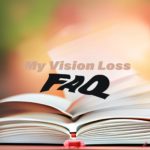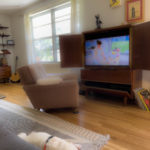 Since becoming legally blind two years ago, I’ve answered a lot of friends’ questions about the new world I find myself in. I thought it might be helpful to write down the answers to the most frequent questions I hear from those around me.
Since becoming legally blind two years ago, I’ve answered a lot of friends’ questions about the new world I find myself in. I thought it might be helpful to write down the answers to the most frequent questions I hear from those around me.
What Can and Can’t You See?
I have a genetic eye disease called Stargardt Disease which causes me to develop a blind spot in the center of my retina. Despite the blind spot, my brain tries to interpret what information it’s receiving from my eyes, meaning I have a fuzzy/hazy spot in the center of everything I see. What this means in practice is that the world is blurry to me and that I don’t have enough visual acuity to read or to see faces clearly. Additionally, I pick up peripheral movement very slowly, so that I can’t see cars until they are close to me. And lastly, I see flashing lights throughout my field of vision all the time.
So that others can get an idea of how the world looks to me, I’ve put together this post on how I see with Stargardt Disease.
 Will your vision continue to deteriorate?
Will your vision continue to deteriorate?
The short answer is that I don’t know. Stargardt Disease is a progressive disease without a treatment or a cure, but vision tends to stabilize eventually. My retina doctor, tells me that he thinks that my vision will likely not deteriorate significantly from where it is now.
You describe yourself as Legally Blind, yet you still have vision, so what does legally blind mean?
The terms blind and legally blind can be confusing since most people assume that someone who is blind has no sight left, yet only 13% of people who are legally blind have no vision at all. The definition of being legally blind is vision of 20/200 or less in one’s better eye with correction. or a visual field of 20 degrees or less
What that mean’s in practicality is that a legally blind person cannot read the top letter in an eye chart.
In my case, I can see a great deal, but I cannot see much detail without some level of magnification help. For instance, to see the TV, I sit a few inches from the TV so I can understand what is going on. When I use a computer, I sit a few inches away from my 43″ computer monitor and turn on magnification in order to be able to read. When I do read, I read very slowly, similarly to the way a five-year-old might read, letter by letter, word by word.
Have your other senses gotten better since you lost your vision?
It’s a common misconception that your other senses get better when you lose your vision, but sadly it’s not true. 60% of brain use is associated with vision, so the less you rely on your vision, the more the brain diverts attention to other senses. For instance, when cooking I rely on my hearing a lot more than I used to in order to tell when a coffee pot is nearly full when I am filling it. Likewise, when trying to use a screwdriver I depend more on feeling with my fingers rather than trying to see with my eyes.
What are the biggest challenges associated with losing your vision?
Number one certainly is losing the ability to drive, and the independence that brings. That has been a very hard pill to swallow.
Next would be writing, something I have always loved doing, but which is very hard for me to do now even using speech-to-text technology. “Reading” is a breeze with the many text-to-speech tools out there, but writing is MUCH more difficult. You know all those embarrassing mistakes Siri makes when writing a simple text? Well, imagine trying to use Siri to compose a few-paragraph email or an FAQ like this. Writing an email that is more than a few lines can take me up to an hour – sheesh.
Next would be the fact that doing most of the things I used to do is much harder, slower, and requires new tools or techniques. I am not a patient person and I have always moved quickly, but now doing even the most basic task can be very time-consuming. I’ve had to reinvent even the most basic aspects of my life to adapt to my vision loss.
Last but not least would be the loss of my ability to work in my chosen field. For 25 years I built web-based products and led R&D teams who were building the future of web-based search. Going from that to being retired was a huge adjustment to make in terms of feeling like a productive individual. I now have to find new ways to feel productive within the confines of my disability. The transition to being legally blind coupled with the loss of my job (not to mention that all this occurred during the first year of COVID) led to some dark and challenging times for me. Not surprisingly, every legally blind person I have met at a local support group has struggled with depression related to their vision loss.
How can you continue to take photographs given your vision loss?
The simple answer is that modern cameras do a lot of the hard work like focusing, setting shutter speed, and aperture. My job is to frame the photo and let the camera do the rest. Even though what I see in the viewfinder or on the screen is blurry, I can see enough to get a sense of how to frame the photo, a skill I’ve honed over more than 40 years. Once I take the photo, I look at a giant copy of it on my 43″ computer monitor before I can tell if it’s any good.
Are there any positives that have come from losing your vision?
As I mentioned earlier, I am not a patient person who likes to sit still or move slowly, and I’ve had to accept living in a new world that requires a tremendous amount of patience and slowness. Additionally, I’ve worked hard to be appreciative of all the things I do have and to appreciate the wonderful things around me instead of concentrating on loss or limitation.